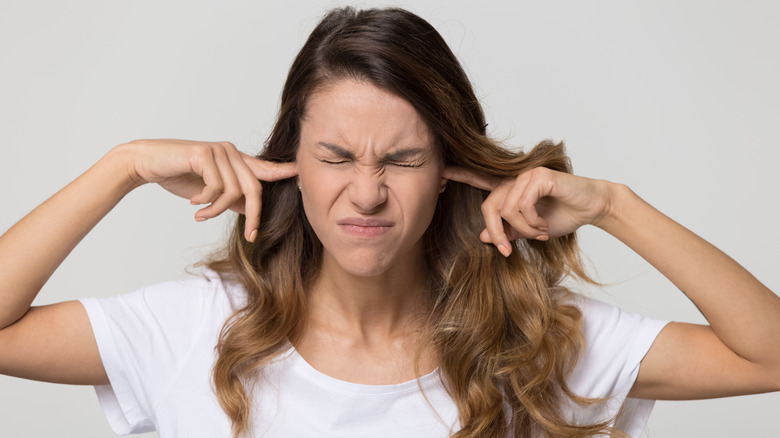What Are Ringing Ears Really A Sign Of?
Ringing in the ears is a common complaint. According to the National Institute on Deafness and Other Communication Disorders (NIDCD), about 10 percent of adults in the United States have experienced the condition, known as tinnitus, lasting for at least five minutes in the past year. That is equivalent to about 25 million people. A ringing or buzzing in one or both of the ears may seem harmless, but for many people it can interfere with everyday activities and overall quality of life (via Cleveland Clinic).
The exact cause of most cases of tinnitus is unknown, but experts believe sound exposure plays an important role. Sounds that are too loud for too long, for example, may lead to tinnitus. People who work in environments that are noisy, such as a construction site or factory, are at a higher risk of the condition. Using power tools, lawn mowers, and leaf blowers for extended periods of time also increases the risk of tinnitus. Additionally, people who listen to music at loud volumes for long periods of time are more likely to experience hearing problems, such as ringing in the ears (via Mayo Clinic).
Other causes of tinnitus
While sound exposure is the most common cause of tinnitus, there are other lesser-known risk factors. For example, a buildup of earwax may cause your ears to start ringing (via Cleveland Clinic). A doctor can remove the earwax to stop these symptoms. Certain medications, such as high doses of aspirin, antidepressants, some antibiotics, and chemotherapy drugs, may also cause tinnitus. Talk to your doctor to determine if any of the medications you're taking may be responsible.
Additionally, dental issues may sometimes lead to tinnitus. A condition known as temporomandibular joint dysfunction (TMD) causes noises like clicking or popping in the jaw and can make you feel like your ears are ringing. If you experience these sensations, talk to your dentist, as a night guard or a dental orthotic device may help. Finally, head injuries and certain diseases, such as Meniere's disease, can lead to tinnitus. Talk to your health care provider, who can help you find the cause and treat underlying conditions.


